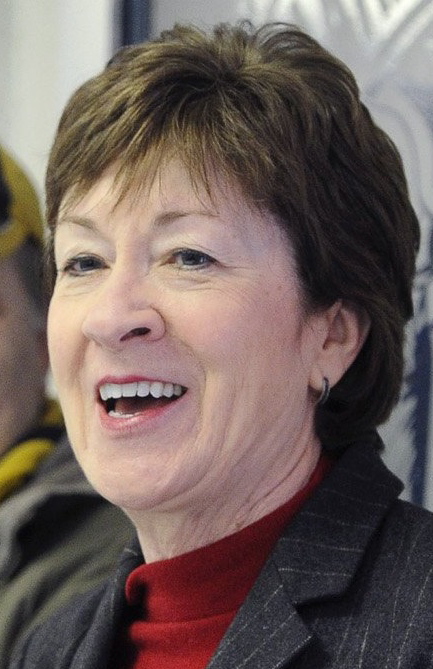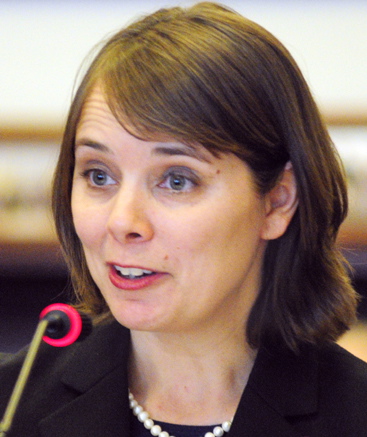BANGOR – Sen. Susan Collins and Democratic challenger Shenna Bellows laid out starkly different positions on increasing the minimum wage, fighting Islamic militants overseas and combating Ebola at home during a fast-paced debate Wednesday night.
In their second joint appearance but the only one to be televised statewide, the two contenders for a Maine U.S. Senate seat were cordial but critical of each other, especially when given the chance to ask each other questions.
For Bellows, the debate hosted by the Maine Public Broadcasting Network and the Bangor Region Chamber of Commerce was an opportunity to show she can square off against an incumbent who she contends is too cozy with Washington’s Republican establishment.
“We cannot afford Republican gridlock in Washington and pretend that everything is OK,” Bellows said before repeating what has become a campaign mantra: “A vote for Susan is a vote for Republican control in Washington.”
For Collins, who has enjoyed a large lead in the polls, Wednesday’s match-up was a chance to remind Maine voters about her reputation as a cross-aisle collaborator in partisan Washington willing to occupy the moderate middle ground.
“When government shut down last year, I put together a coalition … and we hammered out a compromise that led to the reopening of government,” Collins said. “That is how government can and should work. And that is the approach that I want to continue to take.”
Collins’ role in last October’s government shutdown has emerged as an issue during the campaign but was mentioned only briefly Wednesday night. Working with a bipartisan group of other senators, the Republican did offer proposals that served as a framework for the eventual deal between legislative leaders. But Bellows has accused Collins of helping trigger the shutdown by supporting Republican-sponsored budgets doomed for failure with Democrats because they repealed or defunded the Affordable Care Act.
Wednesday’s debate was the second of five between the two candidates. Bellows, a former executive director of the American Civil Liberties Union of Maine, has raised more than $2 million in an aggressive campaign against a popular incumbent who was widely considered a “safe bet” for re-election.
While Bellows has chipped away at Collins’ lead in some recent polls, she has yet to reduce that lead to less than 20 points. And Collins enjoys a sizable fundraising advantage that has allowed to her to maintain a heavy presence on the TV airwaves with commercials touting her record in Washington. The Republican has also received help from national environmental and gun control groups.
In what has become one of the hottest topics of the campaign season nationwide, Bellows reiterated her support for a $10.10 minimum wage while Collins called for a more modest increase to $9 an hour. During one of her chances to ask her opponent a question, Bellows brought up Collins’s $9-an-hour proposal and asked, “How would you feed a family on $18,000 a year?”
Collins responded that “clearly that is not a livable wage” but referred to a report from the nonpartisan Congressional Budget Office predicting that an increase to $10.10 an hour could cost the economy 500,000 jobs. Bellows responded that such “scare tactics” have not been borne out by the job creation seen in 13 states that have increased the minimum wage, although none has gone to $10.10 an hour.
During her chance to question Bellows, Collins asked the Democrat how she plans to pay for increased spending on at least 15 programs, including Medicare and NASA, when the country is already facing a $17 trillion debt. Bellows responded by saying she would cut spending on overseas wars, domestic surveillance programs and excessive incarceration rates.
“It is this Congress, with a war in Iraq costing over a trillion and tax cuts for the wealthiest Americans, that has left us with this debt, that has mortgaged our young people’s future,” Bellows said.
Bellows also blamed the rise of the Islamic State militant group in Iraq on a “misguided policy” that led the U.S. to invade Iraq, a war that had the support of Collins and most Republicans and Democrats in Congress. Bellows also expressed concerns about escalating U.S. military involvement in the region.
Collins responded that the Islamic State group “is just al-Qaida in Iraq under a different name.” And while the incumbent said she supported President Obama’s attempts to work with allies in the region to confront the group, she expressed concerns about other threats in the region.
“I think the president was too slow to come up with a policy to confront ISIS,” Collins said, using another common name for the Islamic State group. “And ISIS is not the only threat that we face.”
The two also clashed on how the U.S. should respond to the threat of a still-growing Ebola crisis in Africa. Collins said she supported travel restrictions on individuals flying from the three most affected countries with exceptions for health care and aid workers while Bellows cited comments from some experts that such restrictions could actually make the situation worse.
Afterward, both campaigns claimed victory during the debates.
Kevin Miller can be reached at 791-6312 or at:
Twitter: KevinMillerPPH
Send questions/comments to the editors.





Comments are no longer available on this story